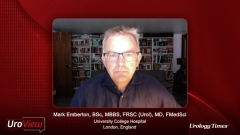
Global Perspective: The Adoption of Focal Therapy in the US and UK
An oncologic urologist from the United Kingdom (UK) discusses the diffusion of focal therapy options for clinically localized prostate cancer in the United States and UK.
Episodes in this series

Mark Emberton, BSc, MBBS, FRSC (Urol), MD, FMedSci: So, the diffusion of focal therapy, again, like MRI, has been interesting. And has been largely subject to jurisdiction issues on the reimbursement on the introduction of new interventional procedures. In the UK, we had quite a few centers start back 10 years ago, 2010. There haven't been that many new centers that have developed. And we were having a discussion with our regulatory agencies about this because it's created a situation of inequity. So, you can get focal therapy very easily if you live in London and the South of England, but it's much, much harder to get if you live in the North of England, and impossible to get if you live in Scotland or Wales. So, there are issues of health equality, or inequity actually, about access. Importantly, that's being addressed by NICE, currently, as they're reviewing electroporation at present, and will be rereviewing the status of high-intensity focused ultrasound. And hopefully, their recommendations will allow a broader diffusion. What's been happening in the USA, has been quite interesting, actually. They were largely late in accepting the concept. But actually, now, I think their uptake and the diffusion of technology, is much more rapid than in the UK or Europe. So, it's all kinds of academic centers now in the USA. Well, not all, but all the ones that I- most of the ones that I know of, now have an established focal therapy program. You know, Mayo Clinic, Memorial Sloan Kettering, UCLA, USD, et cetera. I could keep the list going for quite a while. But they all have an academic, they have clinical program, which is coupled to an academic program. And they're the ones I know about. There's also quite a bit of focal therapy available by experienced users. I think they're overrepresented in Florida, is my understanding, currently in the USA. But the important thing is that diffusion is happening relatively quickly. Now, there's always a danger at this phase of diffusion with any technology that that, you know, as the technology comes out of specialist centers run by great enthusiasms, who've got great experience and are able to train each other in quality control and publish, et cetera. This next phase of diffusion is always it's is always difficult. And we saw it with laparoscopic cholecystectomy. Once everybody started using it, we saw the bile duct injuries. And so, we have to be very careful during this next phase. And we are seeing some reports currently as we did with MRI, of results that perhaps are not as good as they should be, but these reflect the early learning curves, in terms of the focal therapy experience. And it's our job as experienced users to help other people get up to speed. There are very good systems of training now, in terms of online virtual training. We can monitor, there's also offline monitoring of treatment, so it's possible to monitor a treatment that is being done across the world. And, of course, with the use of registries, it's possible to monitor people's outcomes, and monitor their learning curve over time. So, I think we're working quite hard at making sure that the learning curves are short, and that as we expand out from specialist centers, people get up to speed very, very quickly.
Newsletter
Stay current with the latest urology news and practice-changing insights — sign up now for the essential updates every urologist needs.







